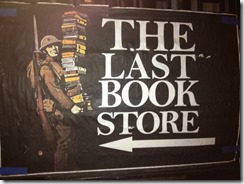by Diane Holmes, (a) Chief Alchemist of Pitch University, (b) lover of learning, and (c) writer of fiction, non-fiction, and the occasional manifesto.
So far…
#1 Websites promote you! Smash.
#2 It’s the only way to find you! Smash.
#3 You’ll be open 24/7! Smash
Here’s another myth that uses fear to make sure writers, specifically book writers, get that website.
MYTH: If readers can’t find you, you won’t sell your book!
Really? Is that because you’re the only one with directions to the bookstore?
Your website is not the last bookstore on the planet.
Seriously.
In fact, I’m pretty sure your website is not a bookstore at all.
Let’s imagine a reader wants something to read. She might go to the library, borrow a book from a friend, stop by a physical bookstore, browse an e-store, or stop by a review site.
But she’s not thinking, “Wow, I’ll search Google to see if I can find a random author website, where I can find out if the author has a book for sale that happens to be something I like and want to read.”
TRUTH: Here’s how you REALLY won’t sell your book. If you don’t have your book in any of the places readers actually go to shop.
What about writers who sell only from their website?
Yeah. Okay. In that case, you have to have a website. You win!
But all you other book authors, a site isn’t your answer to selling. Nope. Then what is a website?
A website is your answer to “give me more.”
And this is a very powerful thing! (Power is so much better than fear. Repeat that a few times. Kinda makes you want to say, “Hell Yes!” doesn’t it?)
Dear book authors, if a reader takes the time to look for your site, that’s an invitation to WOW her. Dazzle her. Pow. Delight. Entertain. Blow her mind. And other good words.
You’ve just been handed the keys to the kingdom, baby. Your reader’s mind has an OPEN sign. She’s willing to listen , create a relationship, and be influenced. You have what marketers call permission, and this is a very valuable thing.
Up until now, she’s not been interested in hearing more. But then she clicked onto your site and said, “You can tell me about your writing now.”
So just to be clear, before now, any selling you did to her was basically a cold call, pushing your message on her whether she wanted it or not.
But now?
You’re in a conversation with her. She’s curious. And you are the thing she’s curious about. Your writing too. You’re the center of her e-universe.
Woo her with your authentic self, your fabulously bound words, your ability to do that thing that you do so well. She’s the fan you’ve been wanting. You know all this because she just told you by showing up.
Click.
Yeah. I can see you blush from here. A fan. You have a real live fan.
Good for you.
Now give her more.
CONTINUED.
—
![clip_image001[4] clip_image001[4]](http://freelance-zone.com/blog/wp-content/uploads/2012/11/clip_image0014.jpg) Diane writes two columns for Freelance-Zone: (1)Fiction-Zone: Leaps in Fiction Mastery and (2) Marketing-Zone:Marketing Yourself and Your Writing.
Diane writes two columns for Freelance-Zone: (1)Fiction-Zone: Leaps in Fiction Mastery and (2) Marketing-Zone:Marketing Yourself and Your Writing.






